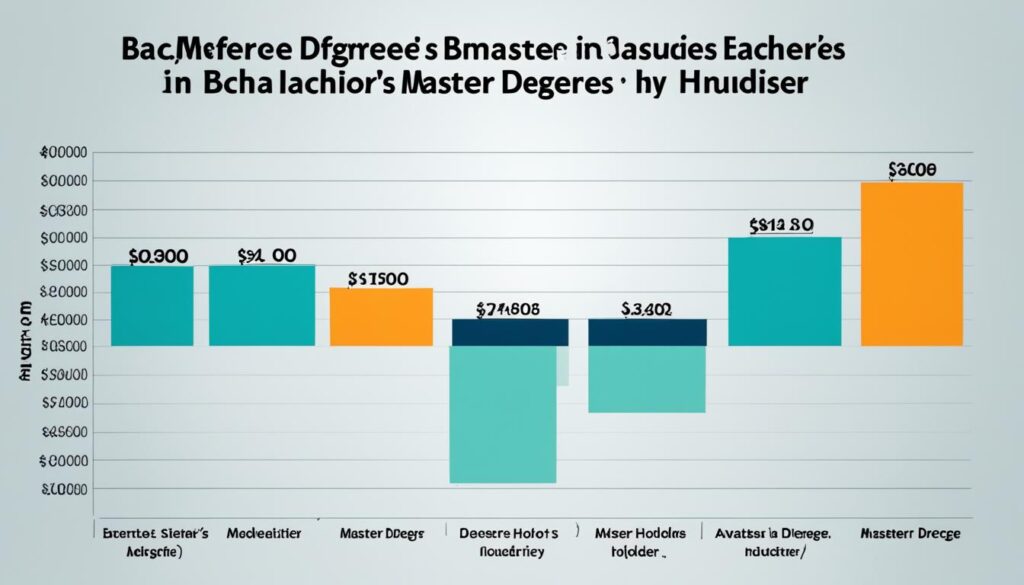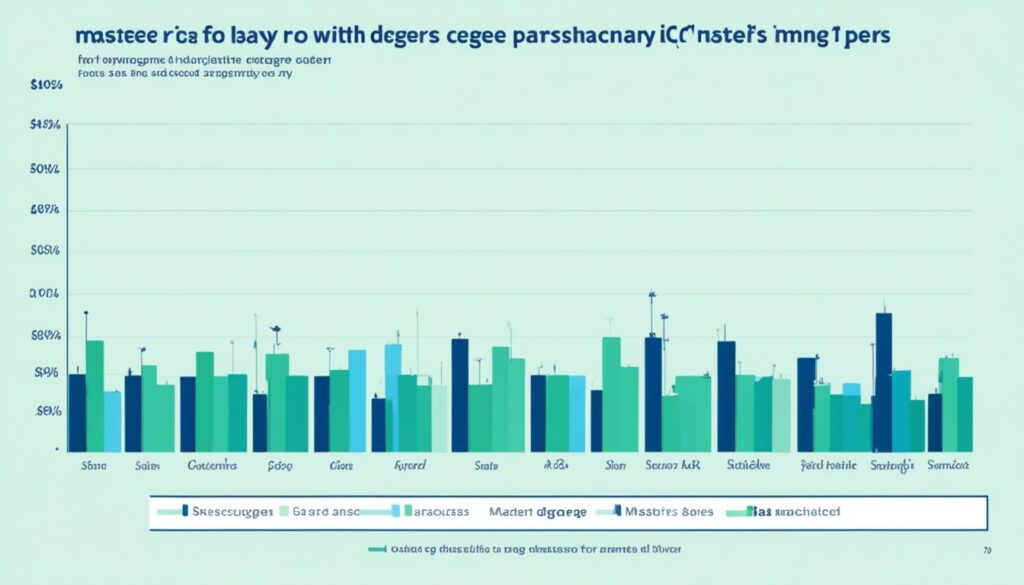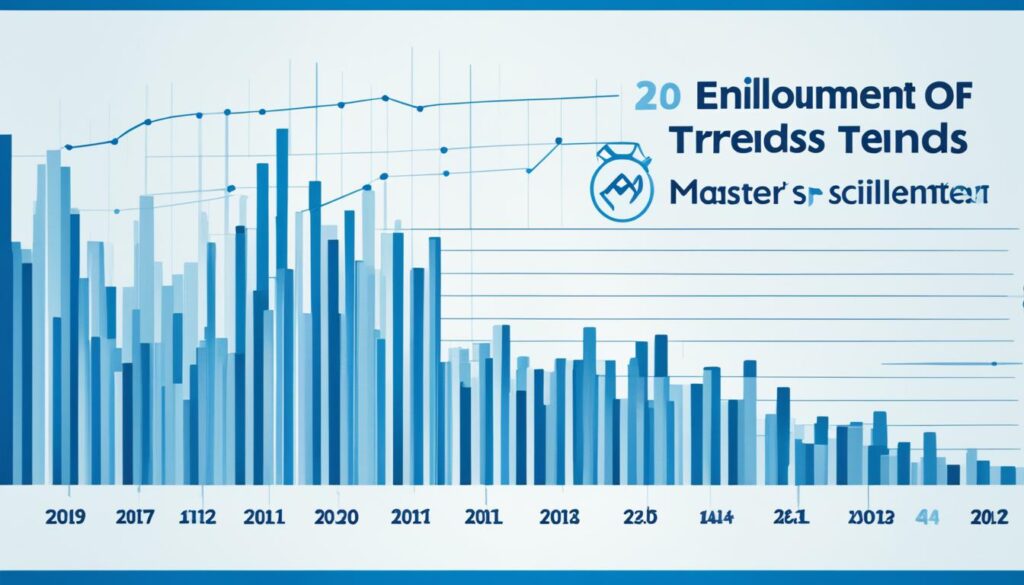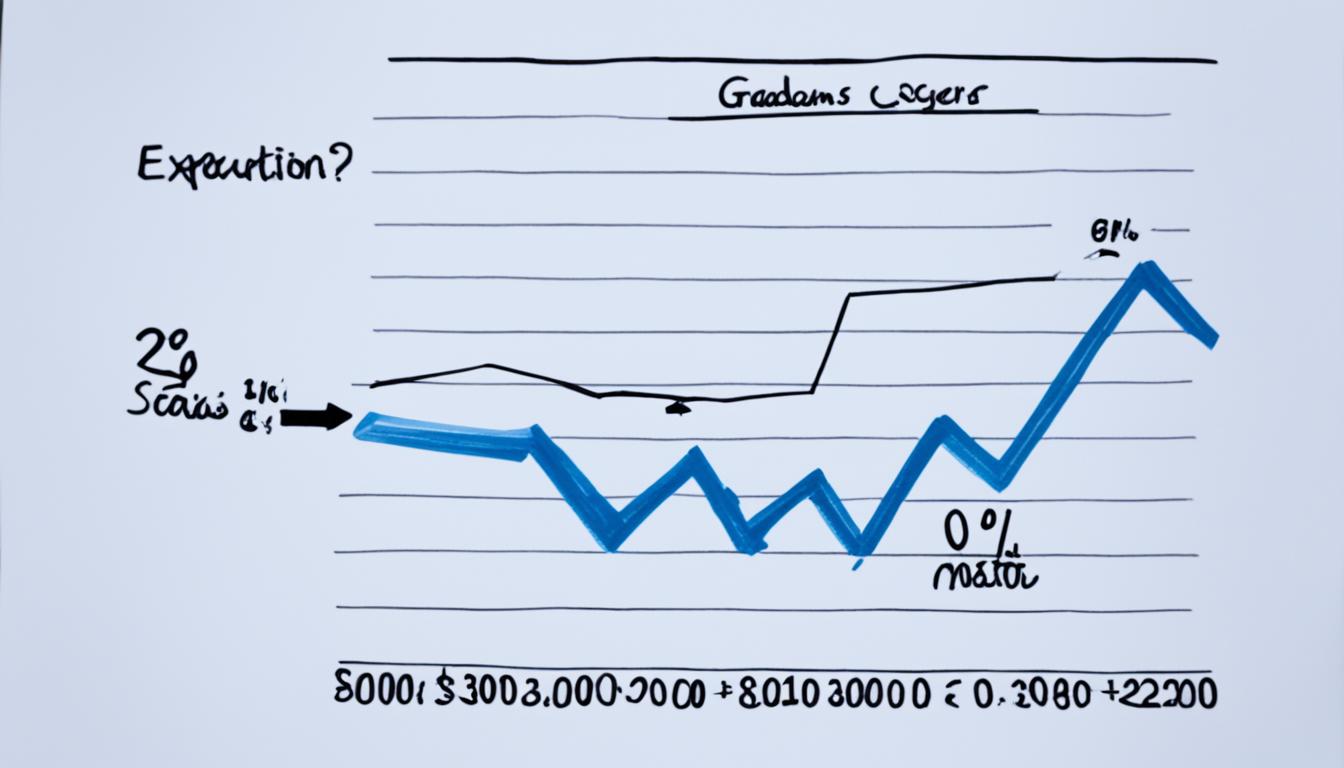Earning a master’s degree can have a significant impact on your salary potential. Studies show that individuals with a master’s degree generally earn higher salaries compared to those with lower levels of education. If you’re considering pursuing a master’s degree, you might be wondering how much of a salary increase you can expect. Let’s explore the relationship between a master’s degree and increased earning potential.
Key Takeaways:
- A master’s degree can lead to higher salaries and increased career growth prospects.
- On average, individuals with a master’s degree earn more than those with a bachelor’s degree or high school diploma.
- The salary differential between master’s and bachelor’s degree holders has been decreasing in recent years.
- Fields such as engineering, computer science, and business tend to offer the highest-paying opportunities for master’s degree holders.
- When deciding whether to pursue a master’s degree, consider your personal goals, industry trends, and financial forecasts.
Average salary with a master’s degree
When it comes to earning potential, individuals with a master’s degree have a distinct advantage. According to the US Bureau of Labor Statistics (BLS), the average weekly salary for those who hold a master’s degree is $1,574, which translates to an annual income of $81,848.
This figure is significantly higher than the median earnings for individuals with a bachelor’s degree, associate degree, or high school diploma. Pursuing a master’s degree can significantly impact your earning potential and open doors to more lucrative career opportunities.
The higher average salary with a master’s degree is the result of several factors. Firstly, advanced education often equates to specialized knowledge and skills, which are highly valued by employers. Additionally, many higher-paying professions, such as healthcare administration, finance, and engineering, often require a master’s degree as a minimum qualification.
However, keep in mind that average salary figures can vary depending on factors such as the field of study, industry, and location. For example, certain industries, such as healthcare and technology, tend to offer higher salaries for master’s degree holders. Furthermore, pursuing a master’s degree in a high-demand field, like data science or cybersecurity, can lead to even greater earning potential.
It’s important to note that while a master’s degree can increase your average salary, it doesn’t guarantee automatic financial success. Your earning potential will also depend on your skills, experience, and the demand for your specific field of expertise.
Ultimately, obtaining a master’s degree can be a strategic investment in your future, providing you with the knowledge and qualifications to excel in your chosen profession. To fully understand the salary potential with a master’s degree, it’s recommended to research average salaries in your field of interest, taking into consideration the specific industry trends and demand for certain skills.

Highest paying master’s degrees
The National Association of Colleges and Employers (NACE) has conducted a survey to identify the highest paying master’s degrees based on average starting salaries. These degrees open up lucrative career opportunities and offer higher earning potential right from the beginning. If you’re looking to maximize your earning potential, consider pursuing one of the following fields:
- Engineering
- Computer Science
- Math and Sciences
- Business
These fields are known for their high demand among employers, ensuring a strong job market for master’s degree holders. Let’s explore some of the highest paying disciplines within these fields:
Computer Engineering, Software Engineering, and Computer Science
Majors in computer engineering, software engineering, and computer science consistently top the list of highest starting salaries for master’s degree holders. With rapid advancements in technology and the ever-growing need for skilled professionals, these degrees offer excellent earning potential and career growth opportunities.
Information Sciences and Systems
A master’s degree in information sciences and systems can lead to well-paying jobs in fields such as data analytics, cybersecurity, and information management. As companies increasingly rely on data-driven decision-making, professionals in this field are in high demand, making it a lucrative choice for career-minded individuals.
Business Administration/Management
A master’s degree in business administration or management equips graduates with the skills to lead and manage organizations effectively. These degrees often lead to high-paying executive positions in industries such as finance, consulting, and technology. As businesses continue to evolve and grow, the demand for skilled business professionals remains strong.
Healthcare Administration
A master’s degree in healthcare administration prepares individuals for leadership roles in healthcare organizations. With the healthcare industry experiencing significant growth and ongoing demand for qualified administrators, graduates with this degree can expect attractive salaries and opportunities for career advancement.
By pursuing a master’s degree in one of these high-paying fields, you can position yourself for a successful and financially rewarding career. Now, let’s explore the job market for these degrees and the potential roles and positions that require a master’s degree.
Jobs that require a master’s degree
In certain professions, a master’s degree is typically required for entry-level positions. These fields often require extensive knowledge or professional licenses, such as healthcare or education administration. Here are some examples of jobs that typically require a master’s degree:
- Computer and Information Research Scientists
- Nurse Practitioners
- Physician Assistants
- Economists
- Education Administrators (Postsecondary)
- Psychologists
- Epidemiologists
- Urban and Regional Planners
- Survey Researchers
- Social Workers
These are just a few examples, and there are many other professions that require a master’s degree. It’s important to research the specific requirements of the field you are interested in to determine if a master’s degree is necessary for the career path you wish to pursue.
Is a master’s degree right for you?
Deciding whether to pursue a master’s degree is a significant decision that depends on your individual goals and circumstances. Taking the time to research and evaluate the potential benefits can help you make an informed choice.
One important consideration is identifying the types of master’s degrees that align with your salary and career aspirations. Look into the specific roles within your field that typically offer higher salaries and the educational requirements for those positions. Websites like the BLS’s Occupational Outlook Handbook or Zippia can provide valuable insights on salaries and education expectations.
When weighing the worth of a master’s degree, it’s crucial to carefully consider your career path and the market fluctuations in your industry. Analyze the demand for professionals with advanced degrees and assess the potential for career growth and stability.
Furthermore, keep in mind the potential benefits that come with a master’s degree. Not only can it enhance your earning potential, but it can also provide you with a competitive edge in the job market. Employers often value the specialized knowledge and skills that master’s degree holders bring to the table.

Ultimately, the decision to pursue a master’s degree should align with your personal and professional goals. Take into account factors such as the time, effort, and financial investment required to complete the program. Consider whether the benefits of a master’s degree, such as increased earning potential and expanded career opportunities, outweigh the costs.
Remember, it’s essential to make an informed choice that aligns with your individual circumstances. Reflect on your long-term goals, career aspirations, and the specific advantages that a master’s degree can provide in your field. By carefully evaluating these factors, you can determine if a master’s degree is worth the investment and suitable for your journey.
Enrollment trends in master’s programs
Enrollment in master’s programs has seen a significant increase in recent years, pointing to the growing recognition of the value of a master’s degree in terms of career advancement and earning potential. While undergraduate programs for associate’s and bachelor’s degrees experienced a decrease in enrollment in 2020, master’s programs witnessed a rise in the number of students. This trend has continued into 2021, with undergraduate enrollment declining further, while graduate enrollment continues to climb.

This shift in enrollment trends indicates that more individuals are choosing to pursue master’s degrees as they realize the benefits it can offer in terms of professional growth and higher earning potential. By enrolling in master’s programs, you position yourself to gain a competitive edge in the job market and open up new opportunities for career advancement.
The cost of a master’s degree
The cost of pursuing a Master’s degree can vary significantly based on several factors, including the school you choose, your chosen major, and the length of the program. According to estimates from EducationData.org, the typical cost of a Master’s degree ranges from $30,000 to $120,000.
When considering the financial investment of pursuing a Master’s degree, it’s crucial to take into account not only the cost of tuition but also other expenses associated with attending graduate school. These expenses may include textbooks, course materials, transportation, housing, and living expenses.

The College Board’s Trends in College Pricing Report reveals that the average cost of one year of a Master’s program is approximately $19,630 for in-state students at public institutions. For students attending private non-profit institutions, the average cost rises to $42,030 per year.
It is essential to carefully evaluate your financial situation and consider the potential return on investment when deciding to pursue a Master’s degree. While the upfront cost may seem significant, it’s crucial to weigh it against the potential long-term benefits, such as increased earning potential and expanded career opportunities.
The benefits of a master’s degree
Earning a master’s degree can have significant benefits that go beyond just the increase in salary. According to the Bureau of Labor Statistics, individuals with a master’s degree earn higher average weekly salaries compared to those with just a high school diploma or a bachelor’s degree. However, the advantages of a master’s degree extend beyond financial rewards.
One of the key benefits of a master’s degree is the enhanced career opportunities it can provide. With a master’s degree, you are more likely to qualify for senior-level positions and leadership roles in your field. Employers often seek candidates with advanced degrees for specialized roles that require a deep understanding of complex concepts and advanced skills.
Another advantage of a master’s degree is the increased job stability it offers. Advanced degree holders tend to experience less impact from economic downturns and have a lower unemployment rate. The specialized knowledge and skills acquired during a master’s program make individuals with this degree more marketable and adaptable to changing industry demands.
Networking and Professional Development
In addition to career advancement and job stability, pursuing a master’s degree can introduce you to a valuable network of professionals in your field. Graduate programs often provide opportunities for networking with peers, faculty, and industry experts. These connections can open doors to collaborations, mentorship, and career opportunities that may not be available to those without a master’s degree.
Moreover, a master’s degree offers opportunities for ongoing professional development. Graduate programs often incorporate practical experiences, research projects, internships, or fellowships that allow you to apply theoretical knowledge and gain real-world skills. These experiences can further enhance your resume, make you a well-rounded professional, and set you apart from other candidates in the job market.
Specialization and Expertise
A master’s degree allows you to specialize in a particular area of study, developing in-depth knowledge and expertise. This specialized knowledge can give you a competitive edge in your field and make you a subject matter expert. Employers often value individuals with advanced knowledge and skills, particularly in industries that require specialized expertise.
With a master’s degree, you can also pursue research opportunities and contribute to advancements in your field. This level of specialization can open doors to careers in academia, research institutions, or consulting firms that rely on the expertise of master’s degree holders.
Personal Growth and Fulfillment
Beyond the professional benefits, earning a master’s degree can also contribute to personal growth and fulfillment. The pursuit of higher education challenges you intellectually, expands your horizons, and encourages critical thinking and analysis. It provides an opportunity for self-discovery, personal reflection, and the development of transferable skills such as communication, problem-solving, and time management.
Furthermore, obtaining a master’s degree allows you to gain a sense of achievement and pride in your educational accomplishments. It demonstrates your commitment to lifelong learning and personal development, which can boost your self-confidence and overall satisfaction with your career and life.
Overall, a master’s degree offers a wide range of benefits, from increased earning potential to enhanced career opportunities, networking, specialization, personal growth, and fulfillment. While the cost of pursuing a master’s degree should be carefully considered, the potential return on investment, both financially and personally, can make it a worthwhile endeavor.
Declining salary differentials for master’s degrees
Recent data from the National Association of Colleges and Employers (NACE) highlights a concerning trend in the salary differentials between bachelor’s and master’s degree holders. While there is still an overall salary advantage for individuals with a master’s degree, the gap has been decreasing in recent years.
The decline in salary differentials can be attributed to several factors. One significant factor is the competitive job market for college graduates. As more individuals obtain advanced degrees, the market becomes saturated with master’s degree holders, making it more challenging to stand out and command higher salaries based solely on degree attainment.
Another contributing factor is a shift in employer focus. Employers are increasingly prioritizing specific skills and competencies over the level of education. This shift is driven by the recognition that practical skills and relevant experience are often more critical for job success than the credential itself.
However, it’s essential to note that certain disciplines still exhibit significant salary differentials for master’s degree holders. Fields such as legal studies and communications technologies often see higher salaries for those with advanced degrees. In these specialized areas, the expertise and advanced knowledge gained through a master’s program can still lead to substantial financial rewards.
To navigate this changing landscape, it is crucial for individuals considering a master’s degree to carefully assess their goals and aspirations. Researching industry-specific salary trends, demand for advanced degrees, and the level of competition in their desired field can help prospective students make informed decisions about their educational and career paths.
Overall, while salary differentials for master’s degrees may be declining, these degrees still hold value in terms of career advancement and expertise acquisition. By staying well-informed about industry trends and taking a strategic approach to their education, individuals can position themselves for success in a competitive job market.
Considerations for potential students
When contemplating whether to pursue a master’s degree, there are several important considerations to keep in mind. These factors will assist you in making an informed decision that best aligns with your personal aspirations and circumstances.
- Passions and Interests: Reflect on your passions and interests to determine if pursuing a master’s degree in a specific field aligns with your long-term goals and aspirations.
- Individual Circumstances: Take into account your individual circumstances, including your current financial situation, personal commitments, and availability to dedicate time and resources to an advanced degree.
- Financial Forecasts: Consider the potential return on investment for a master’s degree in your chosen field. Research the earning potential and job market demand to ensure it aligns with your career expectations.
- Career Trajectory: Evaluate the career trajectory of your chosen field and assess whether a master’s degree is necessary to access higher-level positions and increased salary potential.
- Lifelong Earnings: Look beyond starting salary statistics and consider the potential for lifelong earnings. Research the earning potential and promotional opportunities available to individuals with a master’s degree.
- Demand in the Job Market: Investigate the demand for individuals with specific master’s degrees in the job market. Identify industries and professions where having a master’s degree can provide a competitive advantage.
- Gender and Race Considerations: Understand any potential biases or disparities in the job market related to gender and race. Assess how obtaining a master’s degree may impact your opportunities for career advancement and salary negotiation.
- Industry Trends: Stay up to date with industry trends and projections. Consider whether these trends indicate a shift in job requirements or employment prospects that may influence the value of a master’s degree in your chosen field.
By carefully considering these factors, you can make an educated decision about whether pursuing a master’s degree is the right step for your personal and professional growth.
Conclusion
Earning a master’s degree can significantly increase your salary potential and open up new career opportunities. On average, individuals with a master’s degree earn higher salaries compared to those with a bachelor’s degree or lower levels of education. This higher earning potential is a result of the advanced knowledge and skills gained through a master’s degree program.
However, it’s important to note that the extent of the salary increase can vary depending on various factors. Factors such as the field of study, industry demand, and your individual career trajectory can impact how much of a salary increase you can expect with a master’s degree.
Before deciding to pursue a master’s degree, it is crucial to carefully evaluate your goals, personal circumstances, and market trends. Consider your long-term career goals and how a master’s degree aligns with them. Additionally, research the demand for professionals with a master’s degree in your chosen field and the potential for growth and advancement.
In conclusion, while earning a master’s degree can lead to a salary increase and new career opportunities, it’s important to make an informed decision based on your individual goals and circumstances. By assessing the potential benefits, evaluating the market trends, and considering your personal aspirations, you can determine if pursuing a master’s degree is the right choice for your professional journey.
FAQ
Q: How much does a master’s degree increase salary?
A: Earning a master’s degree can generally increase salary potential and open up new career opportunities. On average, individuals with a master’s degree earn higher salaries compared to those with a bachelor’s degree or lower levels of education. However, the extent of the salary increase can vary depending on factors such as field of study, industry demand, and individual career trajectory. Potential students should carefully evaluate their goals, personal circumstances, and market trends to determine if pursuing a master’s degree is the right choice for them.
Q: What is the average salary with a master’s degree?
A: The US Bureau of Labor Statistics (BLS) reports that individuals with a master’s degree in the United States earn a median of
FAQ
Q: How much does a master’s degree increase salary?
A: Earning a master’s degree can generally increase salary potential and open up new career opportunities. On average, individuals with a master’s degree earn higher salaries compared to those with a bachelor’s degree or lower levels of education. However, the extent of the salary increase can vary depending on factors such as field of study, industry demand, and individual career trajectory. Potential students should carefully evaluate their goals, personal circumstances, and market trends to determine if pursuing a master’s degree is the right choice for them.
Q: What is the average salary with a master’s degree?
A: The US Bureau of Labor Statistics (BLS) reports that individuals with a master’s degree in the United States earn a median of $1,574 per week or $81,848 annually. This is higher than the median earnings for individuals with a bachelor’s degree, associate degree, or high school diploma. While higher education credentials generally lead to higher salaries, it’s important to consider factors such as the field, industry, and location when projecting potential earnings at any education level.
Q: What are the highest paying master’s degrees?
A: The National Association of Colleges and Employers (NACE) has identified the highest paying master’s degrees based on average starting salaries. According to their survey, the top-paying disciplines for master’s degree holders include engineering, computer science, math and sciences, and business. These fields also have high demand among employers. For example, computer engineering, software engineering, and computer science majors have the highest average starting salaries, followed by information sciences and systems, business administration/management, and healthcare administration.
Q: What jobs require a master’s degree?
A: In certain professions, a master’s degree is typically required for entry-level positions. These fields often require extensive knowledge or professional licenses, such as healthcare or education administration. Some examples of jobs that typically require a master’s degree include computer and information research scientists, nurse practitioners, physician assistants, economists, education administrators (postsecondary), psychologists, epidemiologists, urban and regional planners, survey researchers, and social workers.
Q: Is a master’s degree right for me?
A: Whether a master’s degree is worth pursuing depends on your individual goals and circumstances. It’s important to research the types of master’s degrees that can help you achieve your salary and career aspirations. Consider the specific roles in your field that tend to earn higher salaries and the typical education expectations for those positions. Websites like the BLS’s Occupational Outlook Handbook or Zippia can provide valuable insights on salaries and education requirements. Careful consideration of your career path and market fluctuations can help you determine if a master’s degree is worth the investment for you.
Q: What are the enrollment trends in master’s programs?
A: Enrollment in master’s programs has been on the rise in recent years. According to the National Student Clearinghouse, while enrollment in undergraduate programs for associate’s and bachelor’s degrees decreased in 2020, enrollment in master’s programs increased. This trend continued in 2021, with undergraduate enrollment decreasing while graduate enrollment increased. This suggests that more individuals are recognizing the value of a master’s degree in terms of career advancement and earning potential.
Q: What is the cost of a master’s degree?
A: The cost of a master’s degree can vary widely depending on the school, major, and program length. Estimates from EducationData.org suggest that the typical cost of a master’s degree ranges from $30,000 to $120,000. The College Board’s Trends in College Pricing Report states that the average cost of one year of a master’s program is approximately $19,630 for in-state students at public institutions and $42,030 at private non-profit institutions. It’s important to consider the cost of tuition, fees, and other expenses when evaluating the financial investment of pursuing a master’s degree.
Q: What are the benefits of a master’s degree?
A: Despite the cost, earning a master’s degree has historically been associated with higher earnings. According to the Bureau of Labor Statistics, individuals with a master’s degree earn higher average weekly salaries compared to those with just a high school diploma or a bachelor’s degree. Advanced degree holders have also experienced less impact from economic downturns and have a lower unemployment rate. However, the degree to which a master’s degree increases earning potential can vary depending on the specific field of study and the career trajectory.
Q: Are salary differentials for master’s degrees declining?
A: Recent data from the National Association of Colleges and Employers (NACE) shows that the salary differential between bachelor’s and master’s degree holders has been declining. While there is still an overall salary advantage for master’s degree holders, the differential has decreased in recent years. Factors contributing to this decline include a competitive job market for college graduates and a shift in employer focus towards skills rather than degree level. However, certain disciplines still have significant salary differentials, such as legal studies and communications technologies.
Q: What considerations should potential students make when deciding on a master’s degree?
A: When deciding whether to pursue a master’s degree, potential students should consider various factors. These include personal passions, individual circumstances, and financial forecasts. It is important to assess the specific career trajectory of your chosen field, the potential for lifelong earnings beyond starting salary statistics, and the demand for specific degrees in the job market. Additionally, factors such as gender, race, and industry trends should be taken into account when evaluating the potential benefits and drawbacks of pursuing a master’s degree.
,574 per week or ,848 annually. This is higher than the median earnings for individuals with a bachelor’s degree, associate degree, or high school diploma. While higher education credentials generally lead to higher salaries, it’s important to consider factors such as the field, industry, and location when projecting potential earnings at any education level.
Q: What are the highest paying master’s degrees?
A: The National Association of Colleges and Employers (NACE) has identified the highest paying master’s degrees based on average starting salaries. According to their survey, the top-paying disciplines for master’s degree holders include engineering, computer science, math and sciences, and business. These fields also have high demand among employers. For example, computer engineering, software engineering, and computer science majors have the highest average starting salaries, followed by information sciences and systems, business administration/management, and healthcare administration.
Q: What jobs require a master’s degree?
A: In certain professions, a master’s degree is typically required for entry-level positions. These fields often require extensive knowledge or professional licenses, such as healthcare or education administration. Some examples of jobs that typically require a master’s degree include computer and information research scientists, nurse practitioners, physician assistants, economists, education administrators (postsecondary), psychologists, epidemiologists, urban and regional planners, survey researchers, and social workers.
Q: Is a master’s degree right for me?
A: Whether a master’s degree is worth pursuing depends on your individual goals and circumstances. It’s important to research the types of master’s degrees that can help you achieve your salary and career aspirations. Consider the specific roles in your field that tend to earn higher salaries and the typical education expectations for those positions. Websites like the BLS’s Occupational Outlook Handbook or Zippia can provide valuable insights on salaries and education requirements. Careful consideration of your career path and market fluctuations can help you determine if a master’s degree is worth the investment for you.
Q: What are the enrollment trends in master’s programs?
A: Enrollment in master’s programs has been on the rise in recent years. According to the National Student Clearinghouse, while enrollment in undergraduate programs for associate’s and bachelor’s degrees decreased in 2020, enrollment in master’s programs increased. This trend continued in 2021, with undergraduate enrollment decreasing while graduate enrollment increased. This suggests that more individuals are recognizing the value of a master’s degree in terms of career advancement and earning potential.
Q: What is the cost of a master’s degree?
A: The cost of a master’s degree can vary widely depending on the school, major, and program length. Estimates from EducationData.org suggest that the typical cost of a master’s degree ranges from ,000 to 0,000. The College Board’s Trends in College Pricing Report states that the average cost of one year of a master’s program is approximately ,630 for in-state students at public institutions and ,030 at private non-profit institutions. It’s important to consider the cost of tuition, fees, and other expenses when evaluating the financial investment of pursuing a master’s degree.
Q: What are the benefits of a master’s degree?
A: Despite the cost, earning a master’s degree has historically been associated with higher earnings. According to the Bureau of Labor Statistics, individuals with a master’s degree earn higher average weekly salaries compared to those with just a high school diploma or a bachelor’s degree. Advanced degree holders have also experienced less impact from economic downturns and have a lower unemployment rate. However, the degree to which a master’s degree increases earning potential can vary depending on the specific field of study and the career trajectory.
Q: Are salary differentials for master’s degrees declining?
A: Recent data from the National Association of Colleges and Employers (NACE) shows that the salary differential between bachelor’s and master’s degree holders has been declining. While there is still an overall salary advantage for master’s degree holders, the differential has decreased in recent years. Factors contributing to this decline include a competitive job market for college graduates and a shift in employer focus towards skills rather than degree level. However, certain disciplines still have significant salary differentials, such as legal studies and communications technologies.
Q: What considerations should potential students make when deciding on a master’s degree?
A: When deciding whether to pursue a master’s degree, potential students should consider various factors. These include personal passions, individual circumstances, and financial forecasts. It is important to assess the specific career trajectory of your chosen field, the potential for lifelong earnings beyond starting salary statistics, and the demand for specific degrees in the job market. Additionally, factors such as gender, race, and industry trends should be taken into account when evaluating the potential benefits and drawbacks of pursuing a master’s degree.
Source Links
- https://www.cnbc.com/2021/09/24/the-masters-degrees-that-give-the-biggest-salary-boostup-to-87percent.html
- https://www.coursera.org/articles/average-salary-with-masters-degree
- https://www.naceweb.org/job-market/compensation/differential-in-starting-salaries-between-bachelors-and-masters-grads-is-diminishing/


